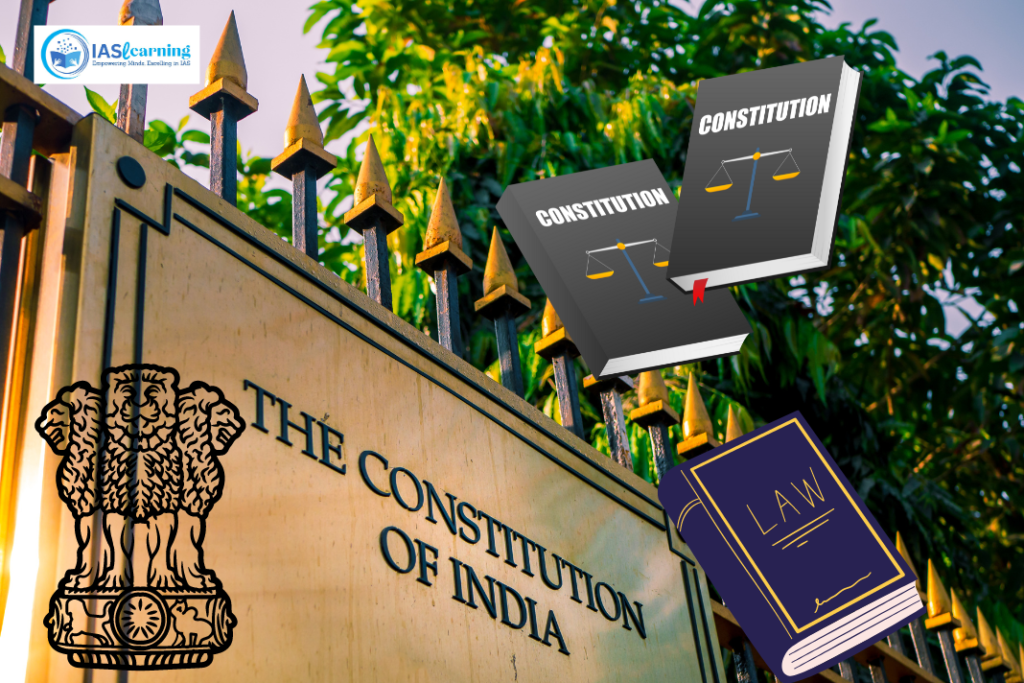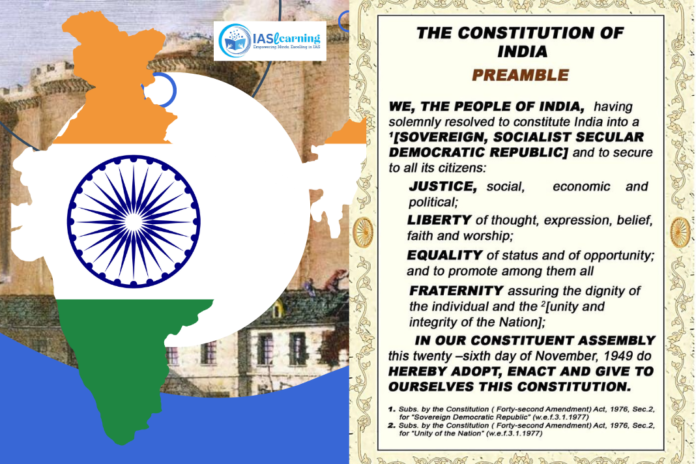Table of Contents
Introduction
The Preamble of India is an introductory statement that outlines the guiding principles and objectives of the Indian Constitution. It was adopted by the Constituent Assembly on 26 November 1949 and came into effect on 26 January 1950, marking the establishment of the Republic of India.
The Preamble of India originally declared India to be a sovereign, socialist, secular, and democratic republic, ensuring justice, liberty, equality, and fraternity for its citizens. It reflects the ideals and aspirations of the framers of the Constitution and serves as a guiding light for the interpretation and implementation of the constitutional provisions.

Preamble of India was amended during the Indian Emergency, which took place in the mid-1970s, by the government led by Prime Minister Indira Gandhi. The words “socialist,” “secular,” and “integrity” were added to the Preamble through the 42nd Amendment Act of 1976. These additions aimed to emphasize the commitment of the Indian state to socialist principles, secularism, and the preservation of national integrity.
The Preamble of India, in its amended form, now reads:
WE, THE PEOPLE OF INDIA, having solemnly resolved to constitute India into a SOVEREIGN SOCIALIST SECULAR DEMOCRATIC REPUBLIC and to secure to all its citizens:
JUSTICE, social, economic, and political; LIBERTY of thought, expression, belief, faith, and worship; EQUALITY of status and of opportunity; and to promote among them all FRATERNITY assuring the dignity of the individual and the unity and integrity of the Nation.
Historical Background Preamble of India
The Objectives Resolution, moved by Jawaharlal Nehru on 13 December 1946, played a crucial role in shaping the principles and values enshrined in the Preamble of India. The resolution was accepted on 22 January 1947 and later adopted by the Constituent Assembly on 26 November 1949, the same day the Constitution was formally adopted.
The words and ideals expressed by B. R. Ambedkar about the Preamble highlight the interdependence of liberty, equality, and fraternity. Ambedkar, who played a pivotal role in drafting the Indian Constitution, emphasized that these principles are not isolated but are interconnected and form a “way of life.” He underlined that liberty should not exist without equality, as it might lead to the dominance of a few over the many. Similarly, equality without liberty could stifle individual initiative. Ambedkar stressed the importance of fraternity, as it creates a sense of brotherhood and unity necessary for liberty and equality to be a natural course of societal development.
The philosophical underpinnings articulated by Ambedkar underscore the comprehensive and integrated nature of the principles embedded in the Preamble, reflecting the framers’ vision for a just and inclusive democratic society in India.

Preamble of India: Integral part of the Constitution
The status of the Preamble to the Constitution of India has been a subject of judicial interpretation, and the Supreme Court of India has provided clarifications over time.
In the Berubari case (1960), the Supreme Court initially held that the Preamble is not an integral part of the Constitution and, therefore, is not enforceable in a court of law. However, this perspective was later reconsidered in the landmark Kesavananda Bharati v. State of Kerala case in 1973. In the Kesavananda case, the Supreme Court overruled its earlier decision and recognized that the Preamble is an integral part of the Constitution. The court acknowledged that while the Preamble may not be enforceable as a source of legal rights, it can be used as a key to understanding the constitutional objectives and principles.
The Kesavananda case is particularly significant because it established the concept of the “basic structure” of the Constitution, implying that while the Parliament has the power to amend the Constitution, it cannot alter its basic structure. The court stated that the Preamble is a part of the basic structure of the Constitution.
In the 1995 case of Union Government vs LIC of India, the Supreme Court reiterated that the Preamble is an integral part of the Constitution. The court emphasized that the Preamble embodies the ideals and aspirations of the people of India and is reflective of the basic structure of the Constitution.

Comprehensive understanding of keywords of Preamble of India
- Sovereign:
- Definition: The independent authority of a state; the power to legislate on any subject without being subject to the control of any other external power.
- Internal Sovereignty: Relates to the relationship between the state and individuals within its territory.
- External Sovereignty: Denotes the independence of a state in its dealings with other states in the international arena.
- Socialist:
- Definition: Refers to social democracy, emphasizing achieving socialist goals through democratic, evolutionary, and non-violent means.
- Directive Principles of State Policy: The Constitution had socialist content even before the term was added by the 42nd Amendment in 1976.
- Secular:
- Definition: The relationship between the government and religious groups is determined by the constitution and law; it separates the power of the state and religion.
- Incorporation: The term “Secular” was added by the 42nd Amendment in 1976.
- Democratic:
- Definition: The people of India elect their governments through universal adult franchise.
- Representation: Not just political democracy but also social and economic democracy, providing freedom to choose representatives and safeguarding against tyrant rulers.
- Republic:
- Definition: In a republican form of government, the head of state is elected, not a hereditary monarch.
- Indian Context: India has a president who is indirectly elected for a fixed term, ensuring no proprietary right to public power.

- Justice:
- Social Justice: Absence of socially privileged classes, elimination of discrimination based on caste, creed, color, religion, gender, or place of birth.
- Economic Justice: Equitable distribution of wealth, economic equalities, and decentralization of economic resources.
- Political Justice: Equal and fair opportunities for political participation without discrimination.
- Liberty:
- Definition: Refers to the freedom of activities for Indian nationals, with reasonable restrictions within constitutional limits.
- Equality:
- Definition: Absence of special privilege, providing adequate opportunities for all individuals without discrimination.
- Fraternity:
- Definition: Feeling of oneness and a sense of belonging with the country among its people.
- Addition: The word ‘integrity’ was added to the Preamble by the 42nd Constitutional Amendment in 1976.

